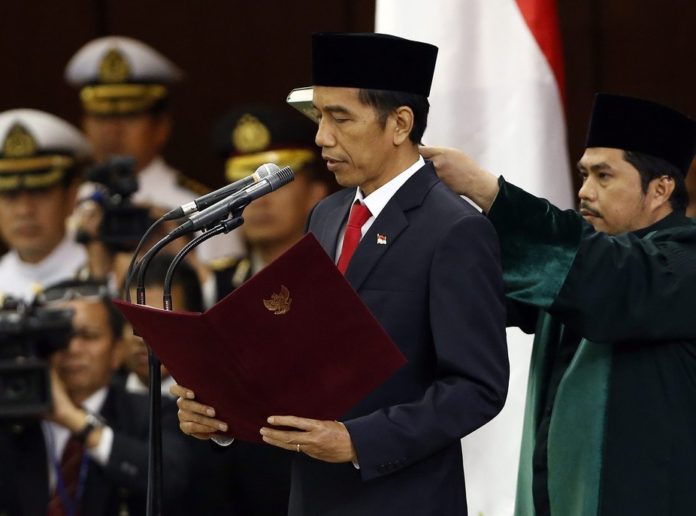
By Sri Budi Eko Wardani, University of Indonesia
In Indonesia, people are celebrating. Joko Widodo’s supporters joined a parade on Monday to welcome him and Jusuf “JK” Kalla on the day they were sworn into office as Indonesia’s new president and vice-president.
After a gruelling process, Jokowi, as the new president is popularly known, and JK won against former general Prabowo Subianto and Hatta Rajasa with 53.5% to 46.85% of the vote. When the Constitutional Court rejected Prabowo’s challenge to the election result, Jokowi and JK became the official winners of the direct presidential election.
Who is Jokowi? What are the challenges that lie ahead for him as president of a nation of 250 million people?
A new kind of leader
Jokowi’s place in Indonesia’s political scene differs greatly from that of previous presidents. B.J. Habibie, Megawati Sukarnoputri and Susilo Bambang Yudhoyono had come from the inner circle of Indonesia’s political elite. Abdurrahman Wahid had worked with civil society in the national and international sphere. Jokowi, meanwhile, was a furniture seller before entering politics.
Jokowi started his political career in 2005 as mayor of a Central Javanese town named Solo. He became so popular that when he was re-elected in 2010, Jokowi and his running mate, Hadi Ruyatmo, won 90.09% of the votes.
Jokowi’s fantastic win shows that Solo residents were highly satisfied with his leadership. His down-to-earth style of governing was a magnet that attracted sympathy and popular support, even from people outside of Solo.
Having completed only two years of his second term as mayor, Jokowi agreed to be nominated as candidate for Jakarta governor by the Indonesia Democratic Party of Struggle (PDI-P) and the Great Indonesia Movement (Gerindra) Party.
With Basuki Tjahaya Purnama, better known as Ahok, as running mate, Jokowi ran against the incumbent Fauzi Bowo. Bowo was a strong contender. A Jakarta native Betawi, he had been Jakarta deputy governor for two terms.
Winning the the 2012 Jakarta gubernatorial election was seen as a prestigious and strategic victory for political parties ahead of the presidential election in 2014.
Jokowi defeated Bowo with 53.82% of the votes in a second round of voting. His victory with Ahok, running on the campaign slogan “New Jakarta”, marked the rise of volunteerism as the public’s political participation to support the candidate came from the grassroots community.
Challenges ahead for Jokowi
Having gone from being mayor of a small Javanese town to governor of Jakarta, Jokowi now faces an enormous challenge as president of Indonesia.
First, the Indonesian public has extremely high expectations of his presidency. This can either be seen as a burden or as motivation.
Overcoming increases in inequality
Indonesia’s economy has been growing at a rate of between 5% and 7% a year in the last ten years. But many Indonesians are still poor. The fruits of development have not been distributed evenly.
The gap between the rich and the poor is striking. Indonesia’s economic growth would not mean much if the gap between social classes becomes larger.
The 2003-2013 National Social and Economic Survey shows that the rich increased their incomes much faster than the lower middle class. Average income growth for the rich is three times the average income growth of the lower class, who make up 40% of the population. This demonstrates that not all layers of the society feel the benefits of economic growth. Only the upper-middle class enjoys it.
Jokowi-JK should prioritise social welfare and come up with strategies to close the widening social gap. They should abandon ineffectual policies. They should ensure everyone has an equal chance to access education, health, food and housing.
Eradicating corruption
Another serious challenge is to create a government that is free of corruption.
Yudhoyono leaves behind a massive corruption problem as he ends his presidency. Indonesia ranks as the fourth-most-corrupt country in Asia. Its Index of Corruption Perception has been stagnant at 32 on a scale of 0 to 100 in 2012 and 2013.
Even after efforts to eradicate corruption by the Corruption Eradication Commission (KPK), the list of state officials implicated in graft cases continued to increase. Three cabinet ministers of SBY, two of them his trusted cadres, had to resign because of corruption.
Jokowi has to work hard to restore public trust. He should compose his cabinet to reflect a political will to create a clean, humble and hard-working administration.
Safeguarding democracy
Jokowi’s victory is also a test for Indonesia’s democracy. If there are no changes in the current make-up of the government and opposing coalitions, he would face a parliament controlled by the opposition. The tension between the two political coalitions has been high since the presidential election. Jokowi will have a more dynamic relationship with the parliament than the previous administrations had.
Jokowi’s move ahead of his inauguration to meet with Prabowo Subianto and other party leaders from the Red-and-White coalition might ease tension. However, the short meetings do not guarantee a change of political stance by the opposition.
He still has to prove himself by forming a clean, hard-working and non-transactional cabinet. On the other hand, parties in the Red-and-White coalition will remain critical in resisting Jokowi in their efforts to secure the 2019 election.
Public awareness
At this juncture, Indonesia’s democracy lies in the hands of the public. The people should be constantly critical and alert to safeguard their rights. Indeed, there has been an increased public awareness of the need to guide Jokowi’s administration to focus on the goals of social welfare and to watch over the parliament and the political elite.
On Monday, the public celebrated a new hope with the inauguration of Jokowi and JK. But the people should never let their guard down.
![]()
Sri Budi Eko Wardani has received funding from AusAID, USAID, and The Asia Foundation.
This article was originally published on The Conversation.
Read the original article.




















